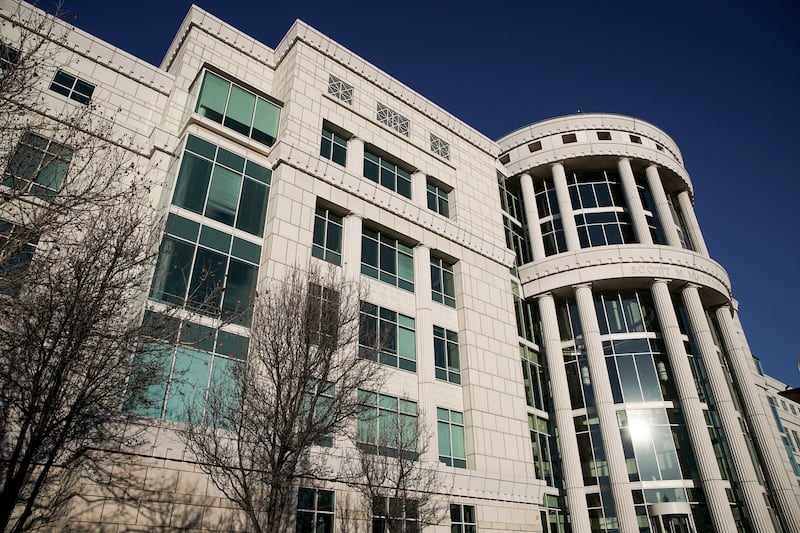For the second time in three weeks, a Davis County general contracting company once accused of labor trafficking has filed a lawsuit against former Utah Attorney General Sean Reyes and his team that brought criminal charges against the company.
On Oct. 28, the owners of Rubicon Contracting LLC and its and parent company, Scandia, filed a federal complaint against Reyes and others alleging abuse of power. On Tuesday, 38 employees of Rubicon, Scandia and Smart Rain — including company presidents, vice presidents, a CEO — filed their own lawsuit in state court against Reyes, his former chief investigator Leo Lucey, investigator Michael Jeter and lead prosecutor Kaytlin Beckett.
The 3rd District Court lawsuit alleges “that employees were publicly linked to manufactured criminal allegations that were later dismissed, resulting in significant harm to their personal and professional lives,” according to a prepared statement from Rubicon.
“Every person has the right to be judged on facts — not headlines,” Rubicon employee Dario Benitez, said in a statement. “Our careers, reputations and families were affected in ways that can’t simply be undone by a dismissal. This filing is about setting the record straight and ensuring that the human impact of these decisions is acknowledged and addressed.”
In November 2023, the founders and five executive members of Rubicon Contracting were charged with multiple counts each of aggravated human trafficking by the Utah Attorney General’s Office. The group was accused of recruiting about 150 people from Mexico to work for the company using H-2B visas. But once in Utah, charging documents alleged that the victims were paid very little and forced to live in deplorable housing provided by Rubicon, while also being forced to pay rent under the threat of deportation.
In July 2024, however, the judge presiding over the case called for a Franks hearing for five of the 10 search warrants served by Jeter and used to collect evidence in the case, noting that statements made by Jeter to obtain the warrants “were knowingly false or, at a minimum, made with a reckless disregard for the truth.”
A Franks hearing is held when it is believed that investigators made false statements or significant omissions in their affidavit submitted to the judge, that was used to get a search warrant approved.
Then, during a contentious hearing in December of 2024, 2nd District Judge Rita Cornish pressed Beckett on whether the case was “vastly overcharged” and asked prosecutors multiple times to come up with specific evidence that all seven individuals charged committed 14 acts of human trafficking each.
“I am thoroughly frustrated, and I am trying really hard to dig deep and find where the state has met its burden," Cornish sternly told Beckett.
Not long after that hearing, the charges were dismissed at the request of the attorney general’s office because of a pending federal investigation.
“The Civil Rights Division-Human Trafficking Prosecution Unit of the Department of Justice and the Department of Homeland Security’s Center for Counter Human Trafficking has initiated a federal investigation into the matter. The state of Utah now defers to the Department of Justice and their pending investigation, and moves to dismiss the pending state litigation without prejudice,” prosecutors wrote in their motion.
The status of that investigation was unknown as of Tuesday.
In the new lawsuit filed Tuesday, employees accuse the attorney general’s office of negligence, vicarious liability, violation of due process, unreasonable search and violating open courts rules. The group says it is seeking accountability “and some degree of recompense for the real harm they have suffered.”
“When government agents abused their power and violated the law to attack a Utah company for political purposes, the loyal workers in this state suffered direct harm. It was known and foreseeable that when government agents submitted materially false and misleading affidavits, and then invited the news media to film the raid, that the businesses employing Utah citizens would be crippled and their employees would suffer serious financial harm,” the lawsuit contends.
The employees say if search warrant affidavits written by investigators had been truthful, a judge never would have approved them.
“The execution of the unlawful and unsupported warrants, however, revealed no evidence of violations of the law. (The attorney general’s office) filed charges against the owners of Rubicon immediately anyway using the same false statements in the affidavits allegedly supporting the warrants, but with no additional evidence obtained from the searches. (Their) conduct caused widespread negative publicity, with foreseeable, indeed expectable, serious economic consequences,” according to the lawsuit.
The employees are seeking punitive and compensatory damages, including “lost wages, lost compensation and emotional distress,” the lawsuit states.
As of Tuesday, Reyes had not filed his response in court to the first lawsuit.

